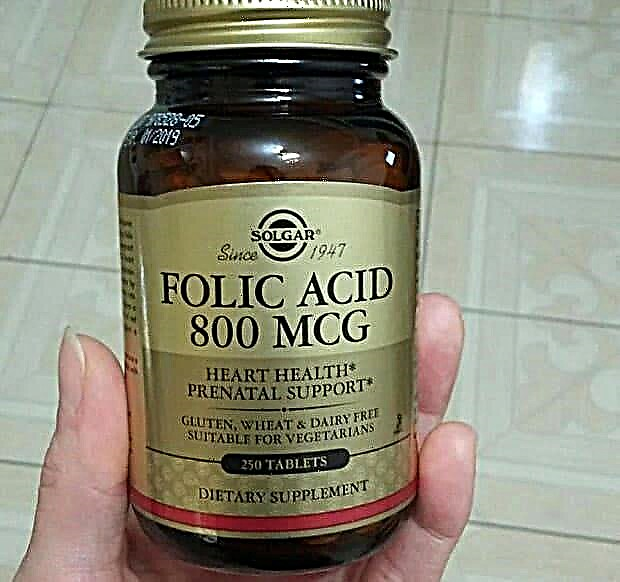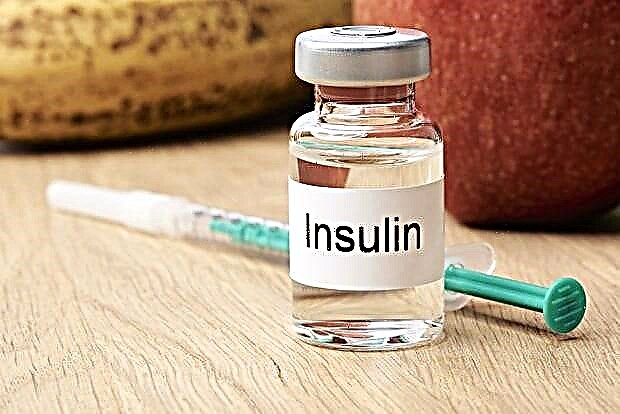Vitamins are an extensive group of organic compounds of various structures, but united by one common feature - the body must receive these substances with food, since their independent synthesis is impossible. These compounds include folic acid - vitamin B9, folacin, which takes an active part in metabolic processes, therefore, its deficiency or excess leads to various pathological processes. Folic acid is used in medical practice, as well as in sports medicine.
Overview of Vitamin
For the first time, the vitamin was discovered during the study of microorganisms. Snell and Peterson noticed that bacteria need some kind of compound to grow and reproduce, which is found in spinach. Vitamin B9 has been named folic acid because its discovery is associated with a green plant: "folium" - a leaf.

The compound is part of a number of enzymes, thus participating in metabolic reactions. An important function of folic acid is to regulate cell growth and development. As a coenzyme, the compound participates in the synthesis of DNA molecules, namely thymidine. This function has been proven on the example of increased bacterial growth when acid is added to the culture medium.
Folic acid has a great effect on the work of the bone marrow, the main task of which is hematopoiesis. This is due to the fact that the production of new blood components is due to the rapid division and growth of cells. For the normal course of these processes, vitamin B9 is needed, since the substance is involved in the formation of nucleotides and DNA replication.
The popular name of the substance "female vitamin" reflects another significant function - folic acid in an increased amount is necessary during pregnancy, as it ensures normal division of fetal cells and their growth. Several clinical studies have shown that a focus group of postmenopausal women with normal blood vitamin levels have a slightly lower risk of developing breast cancer. Therefore, folic acid is believed to protect against the formation of malignant neoplasms.
In addition, the compound has a beneficial effect on the functioning of the digestive tract, promotes the absorption and processing of fats and carbohydrates. Vitamin takes part in the metabolic processes of the cells of the nervous system. Folic acid has an angioprotective effect, that is, it protects blood vessels from various damage, reduces the risk of developing coronary heart disease and other pathologies.
Vitamin B9 as a coenzyme activates the production of serotonin, therefore, in case of depressive disorders, psychiatrists prescribe a complex intake of the main series of drugs and folic acid.
The vitamin is often used by athletes to boost muscle growth, maintain nervous system function, and reduce fatigue.
Standards
Due to the fact that the body cannot synthesize folic acid on its own, its daily intake with food is necessary. Newborn babies on average need 50 mcg per day, by the year the figure rises to 70 mcg, by five - up to 100 mcg. From 11-12 years old, a child needs 200 mcg. The norm for an adult is 400 mcg. Moreover, during pregnancy, the need increases by 200 mcg, that is, a woman needs 600 mcg, and during breastfeeding - 500 mcg.
Products
Back in the 20s of the last century, it was noticed that diet therapy, which includes yeast and liver, cures patients with megaloblastic anemia. Modern research has reliably identified foods containing the highest amounts of folacin:
- fruits and their derivatives, especially citrus fruits;
- vegetables - Brussels sprouts, spinach and other green foods with rich colors;
- grain crops;
- peanuts, vegetable products from beans and peas;
- beef liver.

Supplements
Additional intake of folic acid in the body can be provided by taking specialized drugs. If a person does not have the opportunity to follow a diet enriched with foods high in vitamin B9, doctors recommend taking vitamin complexes. In addition, drugs that include folic acid are prescribed as a prophylaxis or as part of a comprehensive treatment for diseases of the gastrointestinal tract, bone marrow, and during pregnancy. As a rule, with the correct intake of the vitamin, side reactions are not observed. Overdose is manifested by nausea, vomiting, abdominal pain, metallic taste in the mouth, urinary disorders, anxiety, insomnia, and other signs.

Consequences of excess, lack
As a result of many reasons, both hypo- and hypervitaminosis can occur in the body. Both pathologies are characterized by the development of a specific symptom complex, and also pose a danger to the body as a whole.
An insufficient amount of folacin in the blood occurs:
- Against the background of starvation or insufficient varied nutrition. At the same time, the intake of the substance is limited by the alimentary factor, the irregular use of greens, vegetables and fruits.
- As a result of heat treatment of food. In the event that most foods come in processed form, the level of vitamin B9 in the blood decreases. This situation is due to the instability of the structure of folic acid when exposed to temperatures, that is, the vitamin is destroyed.
- Due to a violation of its absorption. The entry of the substance occurs in the small intestine. Some pathologies lead to a decrease in the efficiency of the intestines, as a result of which the penetration of folacin through the enterocytes into the blood decreases. Hypovitaminosis occurs against the background of Crohn's disease, ulcerative colitis.
- Due to dysbiosis. Some of the compound is still produced by the intestinal microflora. After prolonged antibiotic therapy or a previous illness, the balance of beneficial microorganisms may be disturbed, and, consequently, the production of the substance will decrease.
Deficiency of vitamin B9 is manifested by a violation of hematopoiesis in the form of megaloblastic anemia. With a disease, giant blood cells of megaloblasts appear in the blood against the background of a general decrease in the number of normal erythrocytes. The pathological condition is accompanied by rapid fatigue, stool disturbance, gastric achilia, the appearance of aversion to meat dishes, the development of Hunter's atrophic tongue - a number of symptoms, including unpleasant sensations in the muscular organ, a change in taste and appearance of the mucous membrane like "lacquered tongue". The consequence of the progression of the disease is funicular myelosis, which is characterized by impaired gait, the appearance of unpleasant nerve sensations on the surface of the skin, weakness and decreased sensitivity of the limbs.
Reduced concentration of folic acid also leads to early appearance of gray hair, mental disorders, miscarriages.
In the XXI century, hypovitaminosis is extremely rare. This is due to the widespread improvement in the quality of life. The indication for taking vitamin B9 is the prevention of fetal malformation during pregnancy, as well as the identified deficiency of the compound.
Hypervitaminosis develops with vitamin overdose. In this case, damage to the kidneys, nervous system, gastrointestinal tract occurs. In addition, high concentrations of folacin in clinical studies have shown a decrease in the activity of NK cells, the natural killer cells of the immune system. These components of the body's defense exhibit an antitumor effect, therefore, hypervitaminosis increases the risk of developing cancer.
A contraindication to the use of folacin is therapy with cytostatics or anticonvulsants, as well as individual intolerance to the components of the drug.
Interaction with other substances
Folic acid affects the action of cytostatic drugs. The most common representative of this pharmacological group is Methotrexate. The agent acts on rapidly dividing cells, reduces the activity of immune cells. The medicine is prescribed for the treatment of cancer and other pathologies. The mechanism of action is based on a violation of the metabolism of folic acid, and, consequently, a decrease in the activity of atypical cell division. The simultaneous administration of Methotrexate with vitamin B9 levels the antitumor effect. Therefore, folic acid has poor compatibility with cytostatics.

Some medicines for the prevention and treatment of malaria interfere with the folate metabolism of the pathogen. Thus, during treatment, simultaneous intake of a vitamin and a medication is not recommended, however, after a course of therapy, the deficiency of the compound should be replenished.
Taking anticonvulsant therapy in the presence of epilepsy or mental disorders reduces the concentration of folacin.
B9 for men
Under the influence of folacin, many reactions of the metabolism of carbohydrates, fats and proteins occur, which is important for men involved in sports.
Vitamin B9 affects the functioning of the nervous system. Deficiency of the substance leads to increased fatigue, irritability, and depressive disorders. A man can show aggression against the background of a lack of vitamin.
By increasing the activity of natural killer cells, folacin prevents viral infections and the formation of atypical malignant cells.
With the onset of puberty in boys, folic acid is involved in the process of spermatogenesis, which is necessary for the normal functioning of the reproductive system.
Folic acid for women
A normal concentration of folate is especially important for women. During pregnancy planning, doctors recommend taking a blood test for the quantitative content of the vitamin. A deficiency can lead to miscarriage. As a prevention of pathologies of bearing a child, gynecologists prescribe folic acid at the onset of pregnancy, since a woman in a position needs 200 mcg more folacin. The substance is taken according to the instructions. Contrary to popular belief about the safety of vitamins, overdose can lead to undesirable consequences. The period of use of the complex depends on the level of folacin in the blood.
A 2005-2007 BioCycle study found that women who had an adequate diet of vitamin B9 had a reduced risk of anovulation as a result of a moderate increase in the hormone progesterone. At the same time, an increased amount of folacin in the blood serum of postmenopausal women increases the risks of developing breast cancer, as the activity of natural killer cells decreases.
Application in sports
Vitamin B9 is used in professional sports for:
- Stable work of hematopoiesis. The normal number of red blood cells fully replenishes the tissue's oxygen requirements, preventing hypoxia, as a result of which the main metabolic processes, including muscle growth, are accelerated.
- Improving brain activity, maintaining emotional health.
- Normalization of the function of the digestive tract.
- Fight fatigue. Taking complexes containing folic acid allows you to speed up the processes of tissue repair after heavy physical exertion.
Professional athletes regularly monitor the content of vitamin B9 in the blood, since a lack of the substance can lead to a decrease in training productivity and deterioration in competition results.
Slimming Features
Since folic acid accelerates the breakdown of carbohydrates and fats, it is used for faster weight loss. However, taking folacin alone will not produce visible results. First of all, doctors recommend to undergo a comprehensive medical examination to identify the causes of excess weight gain. If the main etiological factor is a sedentary lifestyle and poor nutrition, the specialist will prescribe, in addition to the main measures, the intake of vitamin B9. The secret to losing weight lies in eliminating the cause of excess weight deposition, as well as in an integrated approach.









